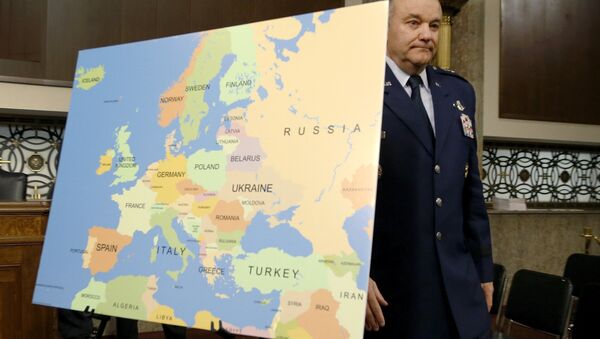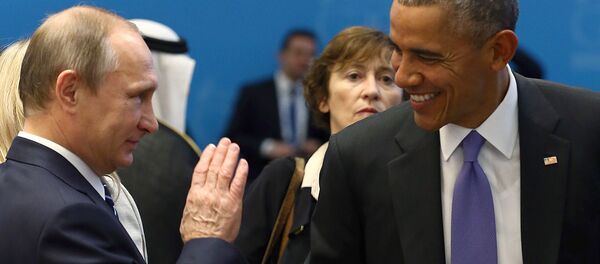Speaking to the Senate Armed Services Committee earlier this month, Breedlove said that "together, Russia and the Assad regime are deliberately weaponizing migration from Syria in an attempt to overwhelm European structures and break European resolve."
Analyzing the general's remarks, and the Western mainstream media's ability to convince many of its readers and listeners that there is truth behind his words, some Russian commentators are simply at a loss for words.
"Generally, we have long become accustomed to Western propaganda's capability to work long and hard to 'prove' that white is black and black is white," Svobodnaya Pressa journalist Alexei Verhoyantsev noted.
"But in this case the charges simply look ridiculous. Is it really possible this time to convince the so-called international community that 'Russia is to blame' for all the ills of the world?"
"It's an open secret to everyone with any understanding of foreign policy that it is Washington that is behind the influx of refugees from North Africa and the Middle East to Europe. Firstly, in agreement with Turkey, the borders were opened. Secondly, American charitable organizations have been used to stimulate the flow of refugees to the Old World."
"And all this began five years ago, when the US catalyzed the Arab Spring and, in Libya, openly overthrew the authoritarian but robust regime of Muammar Gaddafi. Therefore, more than anyone, Americans should blame themselves," that is – their own government's policies.
Breedlove's remarks, according to Shatilov, have several goals in mind, including "serving as one more reason to sculpt the 'enemy image' of [Russia] for the average European man in the street, and attempting to pressure Moscow, in order to get it to give up its support for Bashar al-Assad, or at least become more amenable to negotiations."
"Washington fears that with Russia's help, Assad may become the first Middle Eastern leader to successfully resist US pressure and to stay in power. This would mean a serious moral and political defeat. The last time something like this happened to the Americans occurred after the war in Vietnam, where they were forced to ignominiously withdraw, sinking their reputation in the world for many years afterward."
"Given the fact that the authorities of the major European countries are figures approved and vetted by Washington, the EU's leaders have done everything possible to cover for the 'American trace' to the refugee crisis."
"Earlier, Europeans were told that it was an uncontrolled process, and that they should pity migrants and help them adapt to their new homes. Today, an emphasis has shifted to the 'dark outsiders', in the form of Putin and Assad, who are pictured to be scheming against the continent."
Today, the political scientist suggested, the "precise and well-crafted" tools of media manipulation make it possible to convince large numbers of people to believe in patent untruths.
For his part, Vyacheslav Tetekin, a member of the Russian parliament's Defense Committee, said that while he has "great respect for the US military personnel as professionals…lately their officials have been speaking blatant nonsense."
"If they wanted to shift the blame for the flow of refugees to Europe on someone else's shoulders, they could at least have come up with something more intelligent," the lawmaker noted.
"It's obvious that Washington is behind the migration flows to the Europe — it is their strategy to weaken Europe to some extent. The US and the EU are geopolitical allies, but in economic terms they are sharp competitors. Washington does not want to see Europe feel itself to be self-sufficient."
In other words, "the current influx of refugees is but a new tool, which the US has not yet used against Europe. The EU is now facing serious economic, political and moral costs, while Washington can rub its hands in satisfaction; it's a slimy tactic."
Asked whether there is anything Russia can do to effectively counter the claim that it is to blame for all the world's ills, including the refugee crisis, Tetekin said that unfortunately, there is little to be done.
"Unfortunately, contemporary informational techniques have led to a situation where even intelligent people can be made to believe all sorts of nonsense. It is unlikely that Russia will be able to 'dismantle' this powerful Western informational machine; our task, instead, must be not to pay too much attention to this type of slander, to continue our work, and defend our national interests, including in Syria," Tetekin concluded.







